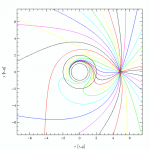Alzrius said:Correct me if I'm wrong, but I thought the dark matter theory had recently been debunked?
Well, that depends. There isn't just one "dark matter theory".
In the most basic sense "dark matter" is merely that matter which is not glowing brightly enough for us to see it with our devices at interstellar distances. By this definition, the Earth itself is "dark matter". The question is simply if there's enough of it or not.
Some attempts have been made to posit some exotic materials among the mundane dark matter, to effectively up the overall mass out there. None of those have stuck particularly well.
Harmon said:I kinda scratched my head, and thought about black holes for a moment- "if what ever amount that isn't here has already been taken into black holes then would that mean that he's really got no clue about the amount of (matter/material/energy) in the universe?"
It isn't really "no clue". You can get estimates on masses based upon how objects move. While dark, the holes exert gravitational effects on bodies that aren't dark. Which isnt' to say that we're 100% certain, but extremes can be eliminated.
What about time? I mean we are looking across a minunum of 5+ yrs to the nearest star to get information, and most of the cool universe stuff is decades, hundreds, and thousands of years older then that, so how can we make an educated understanding of the universe based on reactions and forces that are so much out of date.
Well, what does it matter that the data is old?
If I assume the past works as the present, and I look at that old data, and that data is consident with my current rules, then I can take that as evidence that my current model also held at previous times.
If I assume the past works like the present, and I look at the old data, and that data is not consistent with my current rules, I can take that as evidence that the rules have changed, and I can start looking at how the rules have changed.
Either way, science wins.
Plus, understanding is not only about the here and now:
Consider, for a moment, that you knew nothing at all about cats. Never seen one, never heard of one. And I put you in a room with a 5 year old cat. You could watch it's behavior and learn a few things about it, but some things would remain a mystery. The whole thing about jumpiong in your lap, purring, kneading, and wanting to be stroked would be a bit baffling.
If, however, you look back in that cat's life, back to when it was a kitten, and at how it interacted with it's mother, you'd see where the purring and kneading and stroking come from, and in that context they make much more sense.
Which just goes to show that you need to know about the past in order to fully grok the present. So not only is the age of that data not a barrier to better understanding. It's rather a requirement. If all we saw was how the universe was today, at this instant, we would be able to say much less about how it functions.



